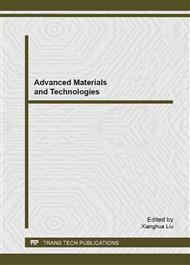[1]
J. Ortiz, A. Aguado, L. Agulló, T. García, M. Zermeño. Influence of environmental temperature and moisture content of aggregates on the workability of cement mortar Original Research Article, Construction and Building Materials, Volume 23, Issue 5, May 2009, Pp. 1808-1814.
DOI: 10.1016/j.conbuildmat.2008.09.016
Google Scholar
[2]
Pashkevich S.A., Golunov S.A., Pustovgar A.P., Adamtsevich A.O. Primenenie protivomoroznyh dobavok v bazovyh shtukaturnyh sostavah sistem fasadnoj skreplennoj teploizoljacii [Application antifreeze additives in basic plastering compositions of external thermal insulation composite systems]. Construction Materials. 2011. №8. Pp. 44-46 (rus).
Google Scholar
[3]
Peter C. Hewlett, PhD, LLD, BSc, CChem, FRSC, FInstMat, FInstConc Tech, FconcSoc. Lea's Chemistry of Cement and Concrete (Fourth Edition), 2003, Pp. 241-297.
Google Scholar
[4]
Thomas Matschei, Fredrik P. Glasser. Temperature dependence, 0 to 40 °C, of the mineralogy of Portland cement paste in the presence of calcium carbonate Original Research Article, Cement and Concrete Research, Volume 40, Issue 5, May 2010, Pp. 763-777.
DOI: 10.1016/j.cemconres.2009.11.010
Google Scholar
[5]
Pashkevich S.A., Adamtsevich A.O., Pustovgar A.P., Golunov S.A., Shishiyanu N.N. Issledovanie formirovaniya porovoy struktury tsementnykh sistem, tverdeyushchikh pri ponizhennykh i otritsatel'nykh temperaturakh [Research of Formation of the Pore Structure of Cement Systems that Harden at Low and Negative Temperatures]. Vestnik MGSU [Proceedings of Moscow State University of Civil Engineering], 2012, №3, Pp. 120-125 (rus).
DOI: 10.22227/1997-0935.2012.3.120-125
Google Scholar
[6]
Pashkevich S.A., Adamtsevich A.O., Pustovgar A.P., Solovyev V.G. Integratsiya, partnerstvo i innovatsisii v stroitelnoy nauke i obrazovanii: nauchnoye izdaniye [Integration, partnership and innovation in construction science and education: scientific edition]. Moscow: MGSU. 2012. Pp. 439-444 (rus).
Google Scholar
[7]
Usherov-Marshak A.V., Sopov V.P., Zlatkovskij O.A. Fiziko-himicheskie osnovy vlijanija moroza na tverdenie betona [Physico-chemical basis of influence frost on hardening concrete]. Naukovo-praktichni problemi suchasnogo zalizobstona [Theoretical and practical problems of modern concrete], Volume 50, 1999, Pp. 391-394 (rus).
Google Scholar
[8]
S.A. Pashkevich, S.A. Golunov, A.P. Pustovgar The Etics Mortars Tests At Negative Temperatures, Vestnik MGSU [Proceedings of Moscow State University of Civil Engineering], 2011, №3, Volume 2, Pp. 180-184 (rus).
Google Scholar


